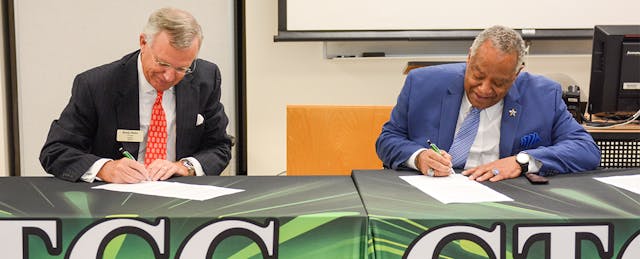A public university in North Carolina has teamed up with six community colleges to offer a program that promises students they will pay no more than $10,000 out of pocket for their four-year degree.
Participating students will attend a two-year college in the state to get their Associate’s degree, then transfer to an online program at Fayetteville State University to finish their bachelor’s. The students will continue to have access to mentors and resources at the local community college to help them stay on track.
In a way, the plan, announced to great fanfare at press events, is about marketing. True, the program will save some students as much as $3,000 over the course of their degree, which is a significant proportion of the total cost. But in many cases, students already qualify for Pell grants that would keep their out-of-pocket costs from ever reaching $10,000 in the first place.
Dolly Horton is vice president of academic and student services administration at one of the participating two-year institutions, Isothermal Community College. She says she hopes that the program will appeal to people in the town, which has lost many manufacturing jobs since the 2008 financial crisis, who want to change careers but who don’t want to move away to get a bachelor’s degree.
“They can stay here and use our facilities, where they’re very comfortable,” she says. “There’s a group of students who don’t want to go live on campus and have dorm fees.”She says that for-profit colleges, some of them lacking accreditation, advertise heavily on television and through online platforms to prospective students in her area. Isothermal already offers degrees in the same majors, such as nursing, for far less than the for-profit providers. One of her challenges is getting that message out.
“We don’t have money to buy the swag and do the television ads,” she says. Instead, the college gets out in the community through partnerships. “If there’s a car show, we’re there. If there’s a job fair, we’re there,” she says. “If we give away anything at those event it’s out of pocket. If there’s candy, I bought it.”
Jon M. Young, vice chancellor and chief of staff at Fayetteville State, said that the $10,000 degree pathway program is not just about price. The participating community colleges and Fayetteville State are working to make the transfer from two-year colleges to the university’s online programs more seamless, and ensure that students avoid taking any courses they don’t need. “We’re going to give students a good roadmap,” he says.
The university, which is an historically black institution, has worked to expand its online programs in the past few years, and they have been growing. This fall, about a third of Fayetteville State’s students are fully online, compared to only 10 to 12 percent five or six years ago, says Young.
Does the college worry that the first-generation students it hopes to serve may struggle in an online format? Young says that outcomes in many of its online programs are comparable to face-to-face ones. And he argues that since the pathway students will complete a two-year degree in an in-person format before moving online, they will have a chance to get used to the college routine before going virtual.
Still, he admits the transition may be an issue.
“But how does that risk compare to those who get convinced to go to one of these online for-profit providers that spend so much money on slick marketing,” he says, arguing that some of those providers have higher price tags and far lower completion rates. “We just want to make sure we’re providing an alternative to that.”
The program is just now opening up to enrollment, and the plan is to start small and work out any kinks before growing, Young says. The university hopes to eventually expand to all of the community colleges in the state.


